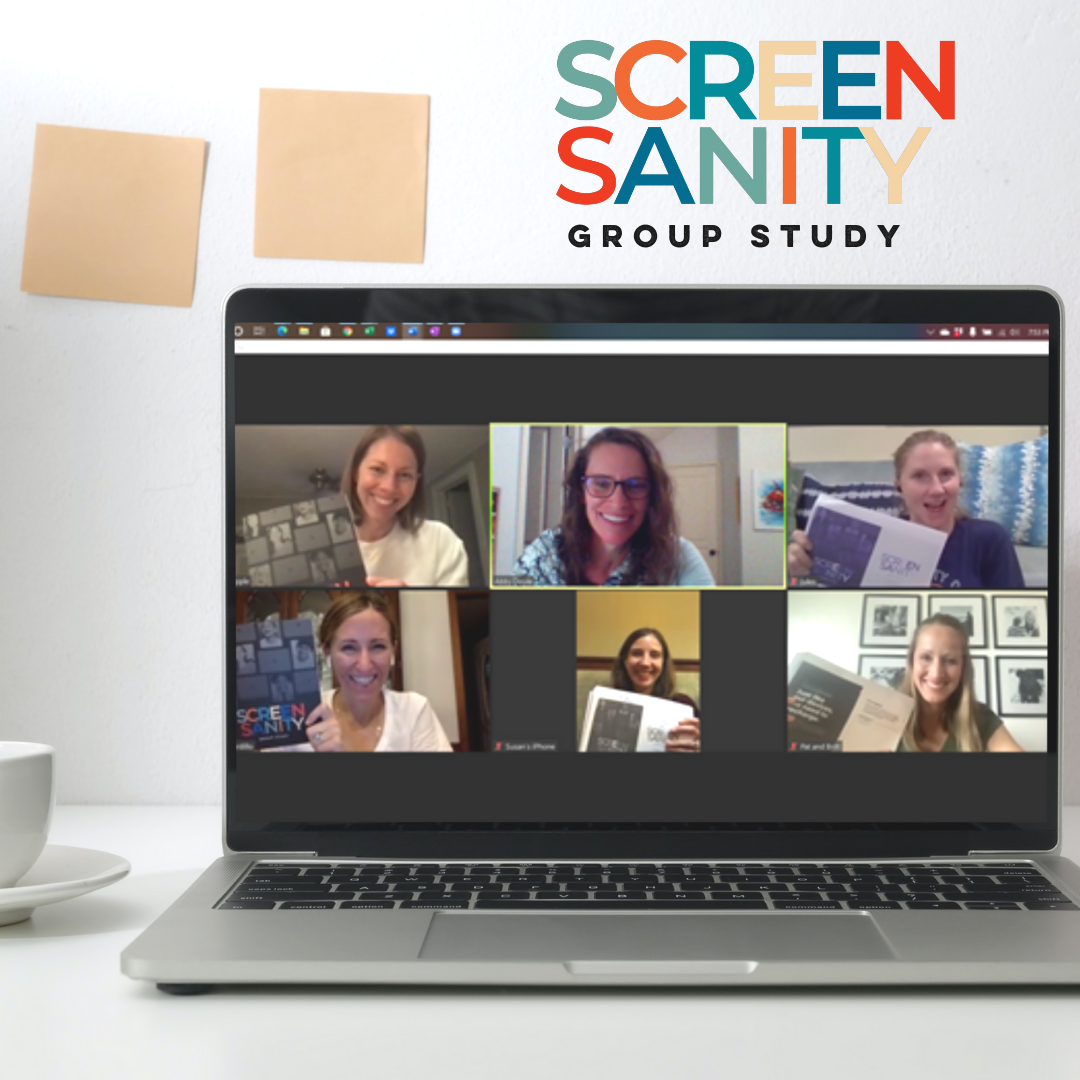
Amy Holsopple is a writer, fitness instructor and the mother of a seven-year-old girl. She hosted a Screen Sanity Group Study in September 2021 with four of her fellow mom friends. Read on to hear her first-hand experience as the group host. You can find Amy on Instagram at @belovedbody.
Where did you host your Screen Sanity Group Study?
AH: On Zoom—very on-trend these days! Although it would have been fun to meet in person, from a logistical and time perspective, it worked best for our group to meet via Zoom.
Who attended your group?
AH: Friends from coast to coast! We had people in San Francisco, Kansas City and Boston. It was a unique and fun opportunity to bring together women from different areas of my life. None of them knew each other before the group study, but because they were all eager and open to learn, a bond and trust quickly formed—and there were lots of laughs, too.
How often did you meet?
AH: We met three times for 90 minutes each session. Navigating time zones and bedtimes was a little tricky, but the virtual and casual nature of our group study provided the flexibility to make it all work. If a little kid popped on video while saying goodnight to mom, it was no big deal (and fun for the rest of us to say hi).
Did you use the Screen Sanity Host Guide? How did you prepare prior to the meeting?
AH: I used the Host Guide for ideas on how to structure the sessions and introduce content. One of the best tips in the guide was to share my “why.” Why I was hosting the group and what my tech struggles were. Leading with a bit of vulnerability set a stage for others to do the same and for us to make strong connections. I also communicated that I was in no way an expert on this topic, and that I was there to learn with everyone else. That took away a bit of pressure I had put on myself.
Why did you decide to host a group study?
AH: Three reasons: Accountability, community and to help others.
Accountability: I want my family to have a healthy relationship with technology but learning about digital health (or any parenting topic) sometimes falls off the to-do list. Or honestly, I’d just rather watch a mindless TV show than focus on self-help when I have a spare moment at night. But a group study format provided the perfect amount of accountability—I showed up because I signed up and there were others joining, too. Interestingly, once I blocked that time on my calendar, I felt immediate relief. Just knowing I’d set aside some time to learn about digital health reduced the mental load. And then once I went to the group study, I learned, was inspired and felt connected and empowered.
Community: I loved an excuse to see my friends for three weeks straight. Now that I live in a different city than some of them, it was a great opportunity to reconnect and learn with each other. Also, realizing you are not alone with parenting challenges is one of the most powerful gifts you can give yourself and each other.
To Help Others: I am so thankful to the person who introduced me to START earlier this year. START’s tools have helped me immensely, and I know they can help so many others. By introducing START to friends and family and hosting a group study, we all have a unique opportunity to be a part of positive change for families and communities.
What common parenting issues or concerns came up with your group?
AH: Most participants had younger kids, ranging from babies to seven-year-olds, so a lot of what we talked about was the challenges of modeling appropriate tech and social media use since our kids don’t have phones yet. One idea we explored was narrating to our spouse or child what we are doing on a phone when they are around. For example, when I’m on my phone, my child has no idea if I’m mindlessly scrolling on Instagram, buying a girl scout badge for her, checking the weather or meal prepping. So, when my kiddo comes in the room, I could say something like, “Hey there! I’m looking up recipes for some of our meals this week. What are you up to?” Nowadays, because almost everything is on our phone, it’s not obvious what we are doing, and to others, that lack of information can lead to feeling ignored or not important.
What would you tell someone who’s considering hosting a Screen Sanity Group Study?
AH: Don’t overthink it. Just do it, and you will not regret it. START provides all the materials you need. Your role is simply to invite friends, pick a spot to host the session, press play for the videos and read the discussion questions out loud to the group. You’re not expected to be an expert by any means, or even a facilitator. Just someone who gathers the group.